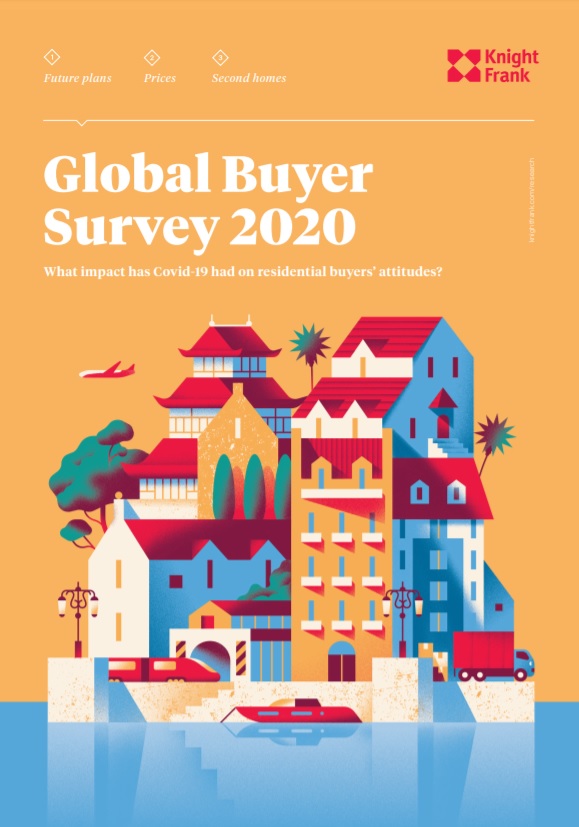(5 Aug 2020, Hong Kong) The Knight Frank Global Buyer Survey released today analyses the impact that the Covid-19 pandemic has had on property markets and, in particular, on residential buyers’ attitudes around the world. The survey, representing the views of over 700 clients across 44 markets highlights that:
- The UK, Spain and France, are the top three locations for those considering a move abroad post-Covid-19
- Improved access to quality of healthcare is now the second most important motive behind a property purchase
- Buyers expect property prices to decline over the next 12 months, although 53% of respondents say their budget has remained the same or increased since the start of the crisis
- Over a quarter of respondents say they are more likely to buy a second home as a result of the pandemic
- Over half of respondents have either travelled abroad already or will do so within three months of borders reopening

Kate Everett-Allen, Knight Frank’s Head of International Residential Research said: “The crisis has fundamentally changed the way we live our everyday lives with the home now a hub from which we work, exercise, learn, socialise and relax.
“With demands on the home expanding and people having had time to reflect on the way they live and use their space, it is inevitable that as we ease out of lockdown these changes will have repercussions on property markets around the world.”
Some of the survey findings are to be expected – a desire for more outdoor space and a home office for example. However, foreign governments’ handling of the Covid-19 crisis has also become a key consideration for second home buyers around the world.
Future Buying Intentions:
One in four people surveyed, said they were more likely to move in the next 12 months as a result of the pandemic, with most of these respondents seeking a different property in the same location (40%). Some 26% said they are willing to move to a different property elsewhere in the same country and 34% of those considering a move are considering a purchase abroad (9% of all respondents).
The UK, Spain and France top the list of preferred destinations to purchase a home, followed by Australia, Canada, Switzerland and the US. All markets that offer a good quality of life, political stability, a secure currency, excellent education systems and in normal times are easily accessible. New Zealand, Portugal, Malta and Norway also ranked highly.
Mei Wong, Executive Director, Head of International Residential Sales, Knight Frank Hong Kong, believes that buyers are already familiar with buying UK property as it ranks as the top overseas investment market. The historical link between UK and Hong Kong, as well as the weakness of the pound will continue to drive demand with effective discounts of around 35% for Hong Kong buyers. We expect that Hong Kong investors will continue to demand prime London as well as UK residential property in the future.
Upgrading the family’s main residence ranked highest as the reason for purchasing, with improved access to quality healthcare ranking second, a holiday home in the sun was ranked third followed by business or employment reasons in fourth place.
Victoria Garrett, Head of Residential, Knight Frank Asia Pacific, says “The desire to upgrade their family homes is – and has historically been – the primary motivator for many residential buyers in Asia Pacific. Price adjustments for the remainder of the year are likely to fall between 5% to a maximum of 10% across the region. This may further drive buyers sitting on the fence to enter the market at what they consider to be opportune prices.”

Lifestyle:
After a period of confinement, the message from survey respondents, not surprisingly, is that buyers want space. Forty-five per cent of respondents say they are more likely to buy a detached family home than they were prior to Covid-19, with waterfront homes (40%) and rural homes (37%) also in favour.
Nearly two-thirds of respondents say they are more likely to work from home post-lockdown, which explains why 64% say a home office is now more important. Thirty-two per cent say their working lifestyle will remain the same as before, suggesting the office still has an important role to play as a hub for innovation, collaboration, education and socialisation.
Not every and all industries can adopt work-from-home plans such as the front-line staff in the banking and property sectors. The work-from-home trend will push the office rent downward with a downsizing trend but the effect will not be catastrophic since the tenants are only trying the work-from-home arrangements and reducing portion of their office but not all of the space, said Patrick Mak, Executive Director, Head of Kowloon Office Services & Head of Tenant Representation, Greater China at Knight Frank.
Unsurprisingly, 66% of respondents say large gardens and outdoor space are more important, with the lockdown period having emphasised the connection between wellbeing and the great outdoors. Privacy is also in demand with 52% of respondents saying it’s more important, and 33% are more likely to want an annex for family members, with Covid-19 perhaps underlining the desire to have elderly or extended family members close by.
Prices:
The survey highlights that buyers expect prices to fall over the next 12 months. The Knight Frank Prime Global Forecast, conducted in April 2020, shows that on average prices are anticipated to fall in 16 of the 20 cities tracked in the report in 2020.
Of the 56% respondents that expect prices to fall over the next 12 months, 27% expect prices to fall by less than 10%, but 25% expect no change and 19% expect prices to increase.
Some 53% of buyers believe their budget has either remained the same or increased since the start of the crisis. With few opportunities to spend during lockdown, it is likely buyers have spent less and saved more. However, over 30% of respondents believe their budget has declined by over 10% since the start of the crisis, no doubt as a result of companies having to resort to salary cuts, reduced hours or redundancies.
Second Homes:
Over 26% of respondents said they were more likely to buy a second home as a result of the pandemic, presumably to enhance their lifestyle and to use as a retreat in the event of a second spike. Knight Frank data supports this view, with a surge in enquiries witnessed immediately after lockdown in prime second home hotspots across France and Italy.
Mark Harvey, Head of International Sales at Knight Frank says, “Buyers are generally seeking three key factors; good broadband, quality healthcare and a property capable of generating a reliable income. We’ve seen Europeans take shorter holidays across multiple locations in recent summers, but I think we may see a return to the traditional European summer with families decamping for four to six weeks at a time and entertaining family and friends in one location. At the heart of this change in buyer attitudes is wellness and family, which is why I think such trends are likely to endure.”
Almost one in three respondents (32%) is more likely to want a second home that they can extend, and 29% are more likely to seek a property offering secondary accommodation. Nearly two-thirds of buyers say when looking for a second home abroad they would be influenced by the government’s handling of the Covid-19 crisis. Markets such as Germany, Austria, Greece, the United Arab Emirates, Singapore and New Zealand may, as a result, rate highly amongst second home buyers in the coming months.












